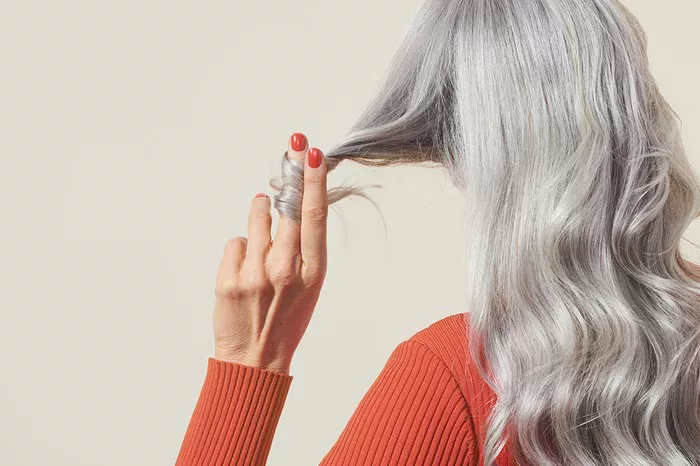Perimenopause is a transitional period before menopause. It typically begins in a woman’s 40s but can start earlier. During perimenopause, the body undergoes hormonal changes. These changes include fluctuating estrogen and progesterone levels. One common symptom is hair loss. Hair may become thinner. It may also shed more than usual.
Hormonal Changes and Hair Loss
Estrogen is crucial for hair growth. It helps maintain the hair growth cycle. During perimenopause, estrogen levels drop. This drop can disrupt the hair growth cycle. Progesterone levels also decrease. This hormonal imbalance can lead to hair thinning. It can also cause hair shedding.
Identifying Perimenopause Hair Loss
Perimenopause hair loss can be identified in several ways. One way is by noticing more hair in the shower drain. Another is seeing more hair on your brush. You may also notice wider parts in your hair. Hair may appear less voluminous. These signs indicate hair loss.
Consulting a Healthcare Provider
Consulting a healthcare provider is important. They can help determine the cause of hair loss. They can also recommend treatments. A healthcare provider may perform blood tests. These tests can check hormone levels. They can also identify other potential causes of hair loss.
Hormone Replacement Therapy (HRT)
Hormone Replacement Therapy (HRT) is one treatment option. HRT can help balance hormone levels. It can reduce symptoms of perimenopause. This includes hair loss. HRT involves taking estrogen and progesterone supplements. These supplements can help restore the hair growth cycle. However, HRT has potential risks. It is important to discuss these risks with your healthcare provider.
Topical Treatments
Topical treatments can also help with hair loss. Minoxidil is a common topical treatment. It is available over the counter. Minoxidil can help stimulate hair growth. It can also slow hair loss. Applying minoxidil twice daily can show results. However, it may take several months to see improvement.
Diet and Nutrition
Diet and nutrition play a crucial role in hair health. Eating a balanced diet can support hair growth. Include foods rich in vitamins and minerals. Vitamins A, C, D, and E are important for hair health. So are iron, zinc, and omega-3 fatty acids. Protein is also essential. Hair is made of a protein called keratin. Ensure you get enough protein in your diet.
SEE ALSO: 18 Best Collagen Peptides for Hair Loss
Vitamins and Supplements
Vitamins and supplements can support hair health. Biotin is a popular supplement for hair growth. It is a B vitamin that helps strengthen hair. Vitamin D is also important. A deficiency in vitamin D can lead to hair loss. Iron supplements can help if you are anemic. Always consult with your healthcare provider before starting any supplements.
Stress Management
Stress can exacerbate hair loss. Managing stress is important for overall health. It can also help with hair loss. Practice stress-relieving activities. These can include yoga, meditation, and deep breathing exercises. Regular exercise can also help reduce stress. Ensure you get enough sleep. Good sleep is crucial for stress management.
Hair Care Practices
Gentle hair care practices can prevent further hair loss. Avoid using harsh shampoos and conditioners. Use products that are sulfate-free. Avoid excessive heat styling. Heat can damage hair. It can also cause it to break. When brushing your hair, be gentle. Use a wide-toothed comb to avoid pulling and breaking hair.
Natural Remedies
Natural remedies can also support hair health. Essential oils like rosemary and lavender can stimulate hair growth. Mix a few drops with a carrier oil. Massage it into your scalp. Aloe vera can also help. It has soothing properties. It can reduce scalp inflammation. Green tea is another option. It contains antioxidants that promote hair growth.
Medical Treatments
Medical treatments are available for severe hair loss. Platelet-rich plasma (PRP) therapy is one option. It involves injecting your own platelets into your scalp. This can stimulate hair growth. Hair transplants are another option. They involve transplanting hair follicles from one part of your body to your scalp. These treatments can be expensive. They also require a healthcare provider’s consultation.
Lifestyle Changes
Making lifestyle changes can support hair health. Quit smoking if you smoke. Smoking can contribute to hair loss. Limit your alcohol intake. Alcohol can deplete your body of essential nutrients. Stay hydrated. Drink plenty of water. Hydration is important for overall health. It also supports hair health.
Regular Health Check-ups
Regular health check-ups are important. They can help monitor your overall health. They can also identify potential causes of hair loss. Regular check-ups can help catch health issues early. This includes hormonal imbalances and nutrient deficiencies.
Support Groups and Counseling
Support groups and counseling can provide emotional support. Hair loss can affect your self-esteem. It can also impact your mental health. Talking to others who are going through the same thing can help. Counseling can also provide coping strategies. It can help you manage the emotional impact of hair loss.
Patience and Persistence
Stopping perimenopause hair loss takes time. Be patient and persistent. It may take several months to see improvement. Stick to your treatment plan. Follow your healthcare provider’s advice. Make lifestyle changes that support hair health.
Conclusion
Perimenopause hair loss is a common symptom. It is caused by hormonal changes. Identifying the cause of hair loss is important. Consult a healthcare provider. They can recommend treatments. Hormone Replacement Therapy and topical treatments can help. Diet and nutrition play a crucial role. Vitamins and supplements can support hair health. Managing stress is important. Gentle hair care practices can prevent further hair loss. Natural remedies and medical treatments are available. Making lifestyle changes can support hair health. Regular health check-ups are important. Support groups and counseling can provide emotional support. Be patient and persistent. Stopping perimenopause hair loss takes time. Follow your treatment plan. Make lifestyle changes that support hair health.

